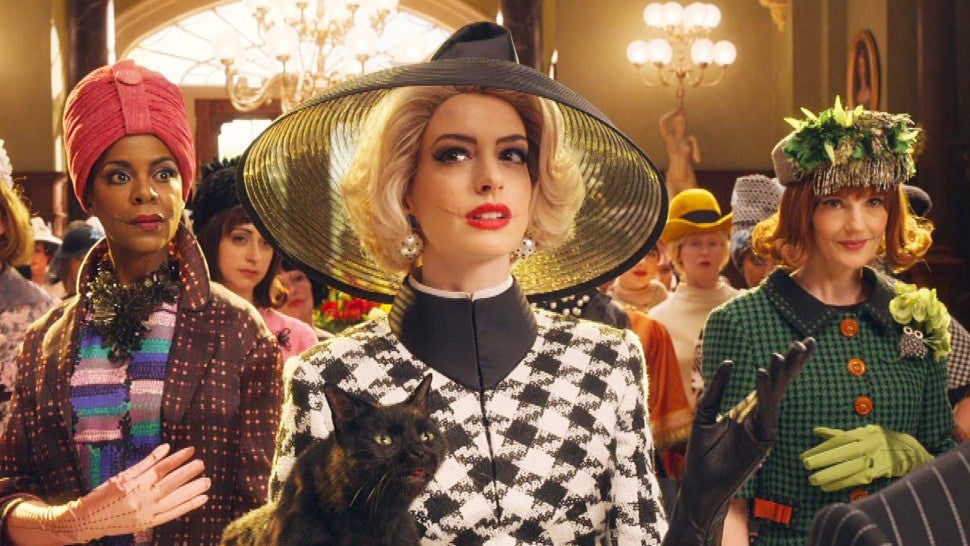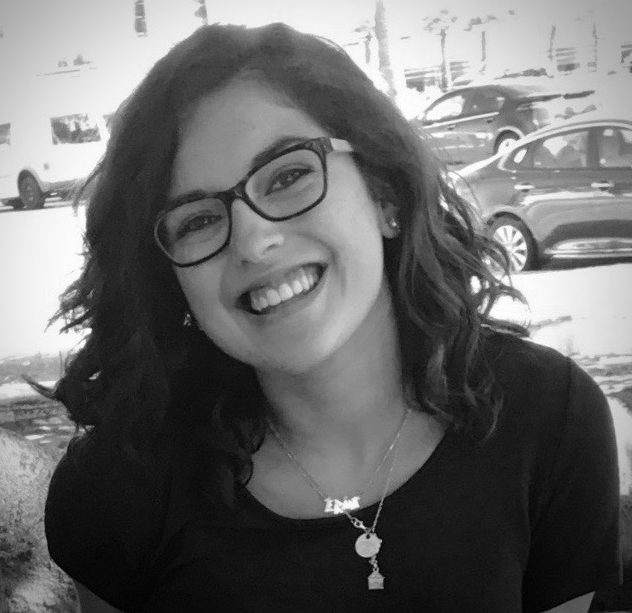 Anne Hathaway and cast in “The Witches”
Anne Hathaway and cast in “The Witches” Jewish disability awareness and education organizations RespectAbility and the Ruderman Family Foundation, together with prominent members of the disability community have condemned the depiction of characters in Warner Bros’ remake of “The Witches.” RespectAbility said the use of physical impairments in the characters’ hands in the movie is not only offensive to those with limb differences but can have damaging consequences.
In the film, based on Roald Dahl’s 1983 novel of the same name, Grand High Witch (Anne Hathaway), is shown with hands that are similar to the limb abnormality ectrodactyly. Also referred to as “split hand,” it involves the deficiency or absence of one or more central fingers of the hand or foot.
“The decision to make this witch look scarier by having a limb difference – which was not an original part of the plot – has real-life consequences,” RespectAbility’s Vice President, Communications Lauren Appelbaum said. “Unfortunately, this teaches kids that limb differences are hideous or something to be afraid of.”
“The decision to make this witch look scarier by having a limb difference – which was not an original part of the plot – has real-life consequences.” — Lauren Appelbaum
RespectAbility regularly advocates for more authentic portrayals of disabilities on screen as well as the hiring of people with disabilities behind the camera.
Jay Ruderman, President of the Ruderman Family Foundation, also weighed in on the film’s controversy by noting the lack of representation on and off camera. He said the film,”shows the importance of inclusive hiring practices for roles in front and behind the cameras, and for enhancing representation within organizations in the entertainment industry.”
The Jewish organization works closely with studios and frequently calls on actors, directors, writers and executives to work to make Hollywood more inclusive. In January, they wrote an open letter encouraging entertainment leaders to audition more actors with disabilities and cast qualified performers with disabilities, thereby improving their visibility and expanding overall talent pools.
“A diverse and inclusive production team and cast can and should provide important contributions to create a tolerant and accessible environment,” Ruderman added. “It can lead to a filmmaking culture with similar values.”
Writer, director and disability advocate Ashley Eakin said in a statement that mistakes like those in “The Witches” prove that “our voices are needed now more than ever.” Eakin, who has limb differences, recently graduated from RespectAbility’s lab for entertainment professionals with disabilities and said that disabilities are frequently falsely represented in television and film. She said all she is asking for from creatives and executives is to challenge the stereotypes “we have seen for decades, with the hope of building a better culture than the one I grew up in.”
She added, “In Hollywood, there has been a long unfortunate legacy of disfigurement/disabilities being a characteristic of a villain or something scary. But to see it in 2020 – and tacked on something inconsistent with the source material is so disheartening. We have to speak up about these issues because apparently, a large group of people aren’t hearing us.”
British Paralympic swimmer Amy Marren was one of the first to call out Warner Bros. Activist and speaker Nicole Kelly also shared her thoughts on the film. Paralympic Games also condemned the film adding the hashtag #NotAWitch to celebrate and normalize disability.
@WarnerBrosUK was there much thought given as to how this representation of limb differences would effect the limb difference community?! @ReachCharity @RoaldFull pic.twitter.com/kiTEAuYt7i
— Amy Marren (@amy_marren) November 2, 2020
Limb difference is not scary. Differences should be celebrated and disability has to be normalised. #NotAWitch calls out ‘#TheWitches’ movie for portrayal of disability 👉 https://t.co/aSY1U6TymE pic.twitter.com/UCU87bUeV8
— Paralympic Games (@Paralympics) November 3, 2020
A petition on change.org titled “We are not monsters: Boycott The Witches remake” was created on Nov. 4 by Marinda Bethay.
“My son has ectrodactyly,” Bethay said. “He has one finger on each hand and is missing toes on each foot. He’s a great kid. He’s smart, kind, funny, strong-willed and sassy. He’s a regular kid who happens to be missing some digits. What he is not is evil and grotesque. His limb difference does not make him a monstrosity.” She went on to say, “We have dealt with chronic stares and constant questions since birth, which is now just a fact of life for us… Now I have crippling anxiety about what his peers who have seen this movie might say. Are kids going to point at him in public and call him a witch? ”
In Studio City, Jennifer Manley was looking forward to watching the spooky Halloween movie with her 13-year-old son, Grover. Grover was born without a fully-formed right hand and after hearing about the controversy, she told the Journal she was hesitant to watch.
“I’m second guessing whether we might watch it or not,” Manley said. “The thing about Grover, some of this stuff just goes over his head. He is somebody who is extremely confident and proud of his uniqueness…He thinks so highly of himself he wouldn’t see that movie, ‘The Witches’ and think, ‘Oh I feel bad about myself because of that.’”
Manley added that positive and casual representation can exist and is always nice to see in TV and film. Specifically she noted Season 9 of “The Great British Bake Off” when one of the contestants, Briony Williams, “had a hand similar to Grover’s. It was like ‘Oh, cool. Let’s watch this.”
While Grover may not be aware of the negative impact the film displays, Manley does wonder how it will affect him as he gets older. Still, she said she would rather they watch the film together and discuss the controversy and the movement that came from it so it can be an opportunity to show how things are changing.
“I think it’s so important that we are talking about it and that there is this mobilization. Not only are people saying it is wrong, they are offering solutions,” she said. “People and society can really label disability as ‘bad’ or ‘scary.’ When I look at my son I just see whole. His hand just looks different but it doesn’t mean there is anything wrong. That’s the language we have always worked on.”
According to RespectAbility, Warner Media recently hired a new team to ensure inclusivity. In a statement to Deadline, Nov. 4 they said, “We the filmmakers and Warner Bros. Pictures are deeply saddened to learn that our depiction of the fictional characters in THE WITCHES could upset people with disabilities, and regret any offense caused.”
The studio added, “In adapting the original story, we worked with designers and artists to come up with a new interpretation of the cat-like claws that are described in the book. It was never the intention for viewers to feel that the fantastical, non-human creatures were meant to represent them. This film is about the power of kindness and friendship. It is our hope that families and children can enjoy the film and embrace this empowering, love-filled theme.”
Anne Hathaway made an apology on Instagram Nov. 5 while also teaming up with The Lucky Fin Project. She also told fans to check out their page and the #NotAWitch hashtag so that others can gain a more inclusive perspective on limb difference.
“I have recently learned that many people with limb differences, especially children, are in pain because of the portrayal of the Grand High Witch in The Witches,” the actress wrote.
“Let me begin by saying I do my best to be sensitive to the feelings and experiences of others not out of some scrambling PC fear, but because not hurting others seems like a basic level of decency we should all be striving for. As someone who really believes in inclusivity and really, really detests cruelty, I owe you all an apology for the pain caused. I am sorry. I did not connect limb difference with the GHW when the look of the character was brought to me; if I had, I assure you this never would have happened.”
She continued: “I particularly want to say I’m sorry to kids with limb differences: now that I know better I promise I’ll do better. And I owe a special apology to everyone who loves you as fiercely as I love my own kids: I’m sorry I let your family down.”
For the past few years RespectAbility has helped studios by providing consultations on scripts, conducting training for writers, producers, marketing and PR teams, and providing connections to experienced individuals with disabilities ready to work on a film.
Said Appelbaum, “The disability market is valued at $1 trillion, creating opportunity and incentive for the entertainment industry to stop treating disability as a negative but to showcase people with disabilities for what they are fully capable of.”
UPDATE: This story was updated on Nov. 5 to include a statement from the Ruderman Family Foundation and on Nov. 6 to include a statement from Anne Hathaway.























 More news and opinions than at a Shabbat dinner, right in your inbox.
More news and opinions than at a Shabbat dinner, right in your inbox.